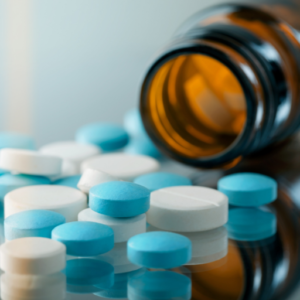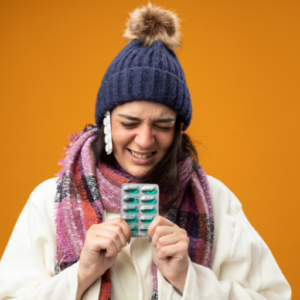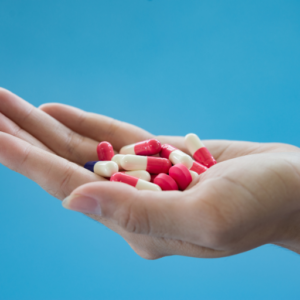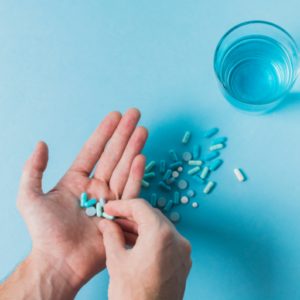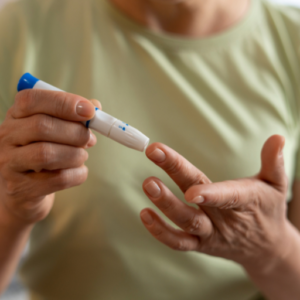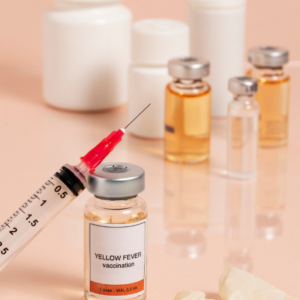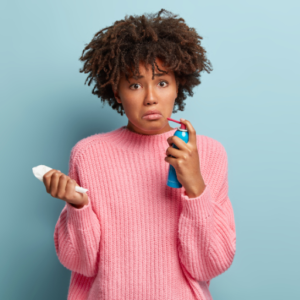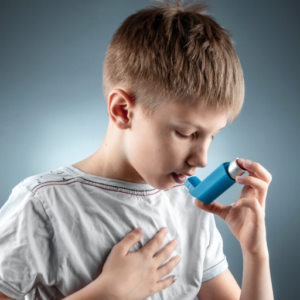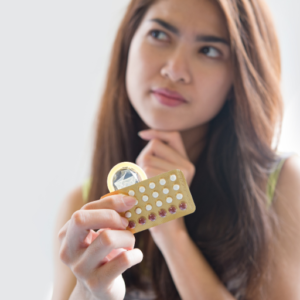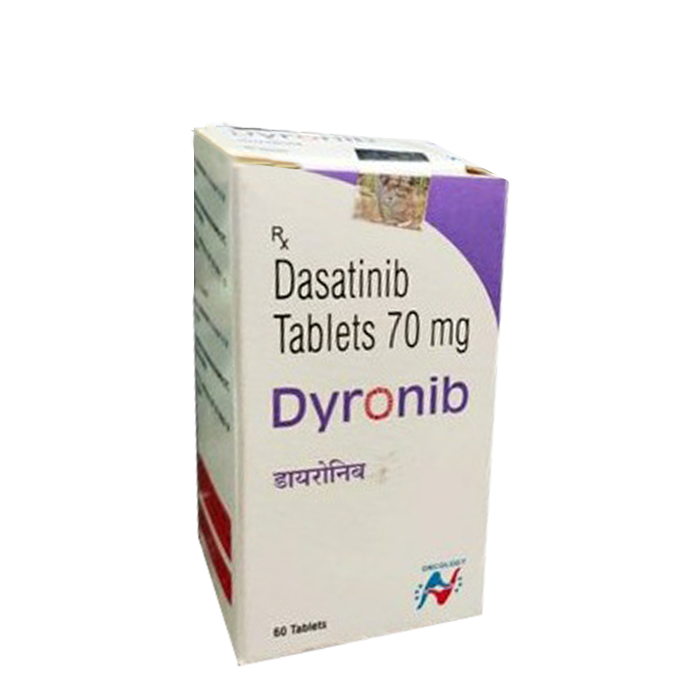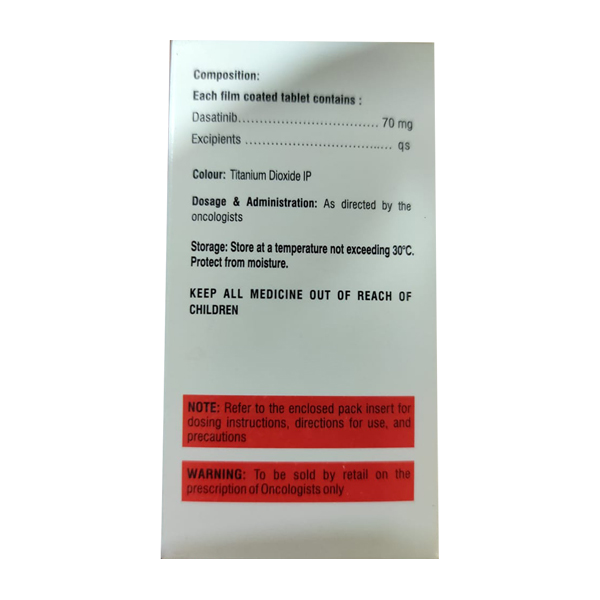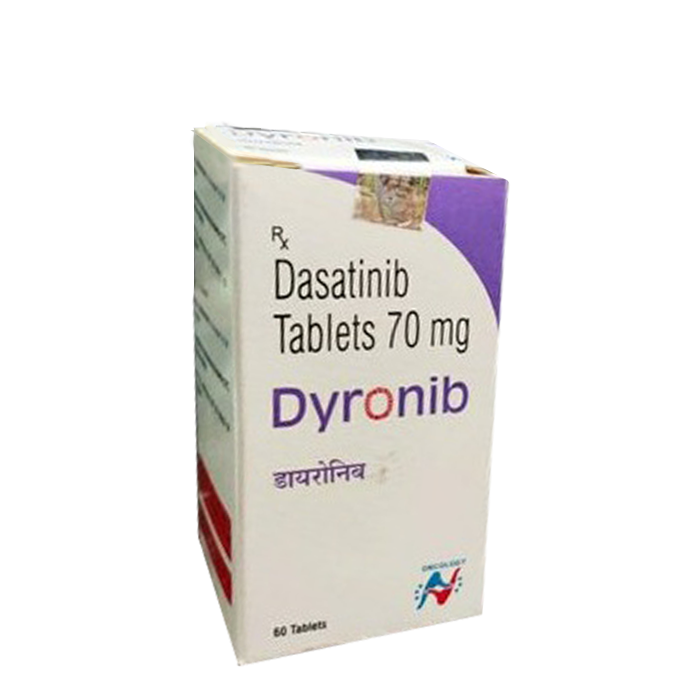Dyronib
| Package | Per tablet | Savings | Price |
|---|---|---|---|
| 360 tablets | $5.56 | $644 | $2646 $2002 |
| 300 tablets | $5.72 | $490 | $2205 $1715 |
| 240 tablets | $5.83 | $366 | $1764 $1398 |
| 180 tablets | $6.18 | $211 | $1323 $1112 |
| 120 tablets | $6.62 | $88 | $882 $794 |
| 60 tablets | $7.40 | – | $441 |
What is this medicine?
DYRONIB (Dasatinib) 70 mg is a tyrosine kinase inhibitor. This medicine is used to treat certain types of leukemia, including Philadelphia chromosome-positive chronic myeloid leukemia (Ph+ CML) and acute lymphoblastic leukemia (Ph+ ALL). It works by slowing or stopping the growth of cancer cells.
What should I tell my health care provider before I take this medicine?
They need to know if you have any of these conditions:
-
liver or kidney disease
-
heart disease or irregular heartbeat
-
lung disease or breathing problems
-
bleeding problems or blood clotting disorders
-
low levels of potassium or magnesium in the blood
-
lactose intolerance (as the tablet may contain lactose)
-
an unusual or allergic reaction to dasatinib or other medications
-
if you are taking immunosuppressive therapy
-
pregnant or trying to get pregnant
-
breast-feeding
How should I use this medicine?
Take this medicine by mouth with a glass of water. It may be taken with or without food. Take it at the same time each day, exactly as prescribed by your doctor.
-
Swallow the tablet whole. Do not crush, chew, or break it.
-
Wash hands before and after handling the tablet.
-
Avoid contact with the powder from broken tablets.
Overdosage: If you think you have taken too much of this medicine, contact a poison control center or emergency room at once.
What if I miss a dose?
If you miss a dose, take it as soon as you remember. If it is almost time for your next dose, skip the missed dose. Do not take double or extra doses.
What may interact with this medicine?
-
antifungal medications (e.g., ketoconazole, itraconazole)
-
antibiotics (e.g., clarithromycin, erythromycin)
-
anti-seizure drugs (e.g., carbamazepine, phenytoin)
-
antacids or H2 blockers (e.g., ranitidine, famotidine)
-
proton pump inhibitors (e.g., omeprazole, pantoprazole)
-
St. John’s Wort
-
medications that affect heart rhythm (QT prolongation)
-
grapefruit juice
This list may not describe all possible interactions. Give your healthcare provider a list of all medicines, herbs, non-prescription drugs, or dietary supplements you use. Also tell them if you smoke, drink alcohol, or use recreational drugs.
What should I watch for while using this medicine?
-
Visit your doctor for regular blood tests and monitoring.
-
This medicine can lower blood cell counts. Watch for signs of infection, bleeding, or fatigue.
-
Tell your doctor right away if you experience unusual bruising, bleeding, fever, or persistent sore throat.
-
Avoid grapefruit and grapefruit juice as they may increase side effects.
-
Women should use effective birth control during treatment and for a time after the last dose. Discuss contraceptive options with your doctor.
-
Men taking this medication should also use effective birth control.
-
Do not receive live vaccines during treatment without your doctor’s approval.
-
Avoid activities that may cause injury due to increased risk of bleeding.
What side effects may I notice from this medicine?
Side effects that you should report to your doctor or health care professional as soon as possible:
-
signs of infection (fever, chills, sore throat)
-
unusual bruising or bleeding
-
shortness of breath or chest pain
-
irregular heartbeat or fainting
-
swelling of hands, feet, or ankles
-
severe headache or dizziness
-
yellowing of skin or eyes (jaundice)
-
muscle cramps or weakness
-
severe abdominal pain
-
vision changes
-
signs of lung problems (dry cough, difficulty breathing)
Side effects that usually do not require medical attention (report if persistent or bothersome):
-
nausea or vomiting
-
diarrhea
-
fatigue or tiredness
-
headache
-
rash or mild skin irritation
-
loss of appetite
-
mild joint or muscle pain
This list may not describe all possible side effects.
Where should I keep my medicine?
-
Keep out of the reach of children.
-
Store at room temperature between 20 and 25 degrees C (68 and 77 degrees F).
-
Protect from moisture and light.
-
Store in the original container.
-
Dispose of unused medicine safely after the expiration date. Do not flush down the toilet or pour into a drain unless instructed to do so.




